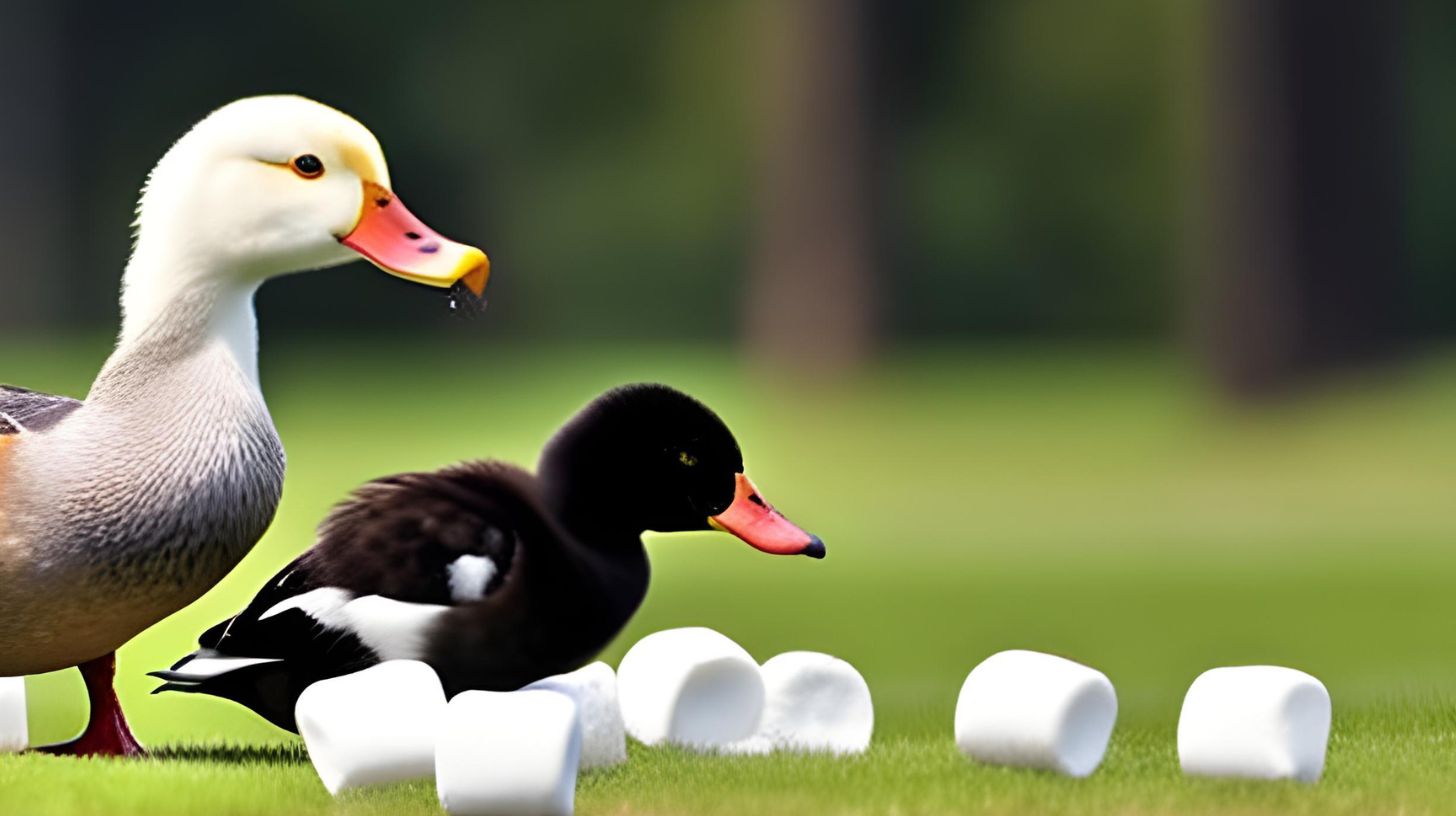Can Ducks Eat Sushi? Vet Explains Serious Risks

Table of content:
Ducks are fun, aquatic birds often found near lakes, ponds and other bodies of water. Many people wonder if we can share our food with ducks, including trendy foods like sushi. So, can ducks eat sushi?
Ducks are omnivorous birds with diverse diets consisting of aquatic plants, insects, small fish, grains and more. Most sushi contains raw fish, rice, seaweed and other ingredients. Ducks can technically eat sushi, but raw fish and excess salt create health risks for ducks. Overall, sushi and its ingredients are not natural duck feeds.
This article explores whether various types of pet, wild and domestic ducks can or should eat the ingredients found in sushi, like rice, seaweed, raw fish and vegetables. We’ll also discuss how ducks digest food, risks of feeding ducks inappropriate snacks like sushi and healthier treat alternatives for our fine, feathered, web-footed friends.
Can Wild Ducks Eat Sushi?
Wild ducks forage for food in marshes, ponds and other wetlands as part of their natural behavior. The diet of wild ducks like Mallards consists of:
- Insects
- Aquatic plants
- Seeds and grains
- Small fish and amphibians
- Algae, zooplankton
This varied diet provides balanced nutrition for healthy digestion, growth and activity.
Sushi ingredients offer little resemblance to the natural diet of wild waterfowl. Importantly, wild ducks lack consistent access to excess salt from soy sauce as found in sushi. Let’s explore if key parts of sushi can or should be eaten by wild ducks.
Can Wild Ducks Eat Sushi Rice?
Rice seems harmless enough. This refined grain makes up a large portion of sushi, rolled up with various fillings or toppings.
Wild ducks normally eat grains and seeds foraged from lakes and wetlands. However, heavily processed white rice differs greatly from whole food sources ducks are adapted to digest.
While unlikely to be immediately harmful, rice offers little nutritional value to wild waterfowl. The starch also breaks down into simple sugars, encouraging rapid growth of bacteria and fungi in duck digestive systems adapted for fibrous matter.
Can Wild Ducks Eat Nori Seaweed?
Nori seaweed wraps around sushi rice in rolls or adorns other types of sushi. But seaweed plays no normal role in the diet of wild ducks.
Dry sheets of nori offer negligible nutrition to wild waterfowl. If soaked in water, the sodium content could potentially cause salt toxicity. Overall, processed nori brings no benefits – only risks – for wild duck health.
Can Wild Ducks Eat Raw Fish from Sushi?
Raw fish like salmon or tuna traditionally make up fillings or toppings in various sushi styles. But can wild ducks safely eat sushi-grade raw seafood?
In certain regions, small freshwater fish occasionally occur in wild duck diets. However, wild birds lack dietary access to raw saltwater catches like tuna.
More importantly, raw seafood brings significant health risks:
- Parasites – Raw seafood may contain parasitic worms or larvae harmful to duck digestive tracts. Cooked sushi fillings reduce this risk.
- Toxins – Natural toxins like mercury accumulate in tissues of large predator fish like tuna. While rare in smaller sushi fish, toxin prevalence remains higher than the live freshwater fish wild ducks may encounter.
Considering the unnatural appeal, sodium content, contamination and digestion risks of raw fish, wild ducks should avoid sushi seafood.
Health Risks of Feeding Wild Ducks Human Foods Like Sushi
In review, wild ducks lack adaptations to properly digest highly refined foods like rice, nori seaweed or raw fish from sushi:
- Wild duck digestive tracts and liver struggle to filter excess salt from soy-based seasonings.
- Wild waterfowl intestines harbor different bacteria than humans adapted to breaking down starchy grains.
- Raw fish bring higher risks of parasites and toxicity.
Feeding any human snacks can encourage wild ducks to lose natural fear. This maladaptive behavior often proves deadly over time. As cute or tempting as it may seem, no element of sushi provides needed nutrition or benefits for wild ducks.
Can Pet Ducks Eat Sushi?
Some people keep breeds of domestic ducks as backyard pets. Pet duck diets focus on commercial pellets or feed blends offering balanced nutrition. Owners also supplement with treats including vegetables, seeds, chopped hard boiled eggs and insects. But can pet ducks also eat sushi?
Similar to wild ducks, key differences between pet duck digestive systems and sushi ingredients discourage feeding sushi:
- Intestinal acidity and microflora differ greatly from human guts adapted to consuming rice and seaweed.
- Raw fish bring higher risks of digestive issues or parasitic infection.
- Soy sauce and other salty, sugary sushi ingredients can cause salt toxicity or weight gain in ducks.
Occasional nibbles of plain vegetables or sushi rice alone likely won’t harm most pet ducks. But as an improper nutritional source offering little benefit and some risk, sushi doesn’t qualify as a wise treat. Let’s analyze the sushi ingredients pet ducks can and can’t safely eat.
Can Pet Ducks Eat Sushi Rice?
The starchy grain forms a main ingredient in sushi rolls, nigiri or sashimi plates. In moderation, some pet ducks may tolerate ingesting small amounts of cooked rice:
- Rice flour is sometimes used in waterfowl feeds.
- The grain contains carbohydrates for energy.
- Cooking helps break down starches for digestion.
However:
- Rice ferments quickly in avian digestive tracts lacking adaptations for starchy grains.
- Excess rice can cause salt toxicity or weight gain.
- Rice offers negligible protein, vitamins or minerals compared to balanced duck feeds.
A few pieces of plain cooked sushi rice once in a while likely won’t harm healthy pet ducks. But rice shouldn’t become a dietary staple or outweigh nutritionally vital proteins, fibers and greens.
Can Pet Ducks Eat Nori Seaweed?
The dried seaweed wrap provides a quintessential part of maki rolls. But as an extremely processed food, nori offers no nutrition and some safety concerns for pet ducks:
- Seaweed lacks healthy fats, proteins or fibrous content to benefit digestion.
- High sodium content can cause salt toxicity.
- Foreign texture and odor may deter ducks unfamiliar with nori.
Overall, it’s best to keep nori rolls away from the water bowl. If consumed, very dilute salt or glutamate seasoning likely won’t immediately harm most pets. But nobody wins from a duck choking down dried seaweed wrappers.
Can Pet Ducks Eat Raw Fish from Sushi?
Sliced raw tuna, salmon, yellowtail or other fish often fill various sushi rolls. Raw meats always introduce higher risks of digestive issues or food poisoning. As cover for wild ducks, raw fish bring a few specific health concerns for pet ducks:
- Dangerous parasitic worms thrive in raw seafood.
- Toxins accumulate more in uncooked fish flesh and organs.
- Foreign digestive enzymes increase illness risks.
Cooked meats mitigate these risks through heat-killing parasites, denaturing toxins and partially breaking down proteins. One cooked ingredient occasionally used in maki rolls – egg custard – offers a safer, more nutritious duck treat.
Overall, raw fish provides unnecessary risks for pet ducks. Table scraps in general can lead to angel wings in juvenile waterfowl as well. Talk to your avian veterinarian before feeding any people food.
Healthy Treat Alternatives for Pet Ducks
In place of sushi or other table scraps, healthier options for pet duck treats include:
- Chopped egg sprinkled over their feed
- Thawed frozen peas or corn
- Insects like mealworms
- Greens like lettuce or kale
- Vegetable matter like sweet potato or squash
- Seeds and grains like millet spray
Check with your duck’s vet before introducing new treats or foraging from your garden. Wash all vegetables to reduce possible pesticide residues.
Can Domestic Farm Ducks Eat Sushi?
Beyond pets, some people raise domestic duck breeds like Pekins or Muscovies for egg or meat production. As with pet ducks, farm-raised duck health relies on a balanced daily diet and favored treats. Can domestic ducks eat sushi?
Domestic ducks digest food quite differently from humans:
- Specialized gizzard organ mechanically pulverizes grains and plant matter.
- Shorter intestines and varied gut flora aid in breaking down fibrous foods.
- Salt glands near the eyes filter excess sodium that humans easily excrete through urine.
These key differences once again indicate sushi offers little nutrition and some safety risks if fed to domestic farm ducks:
- High sodium from soy, sauces, and seaweed can overwhelm salt glands.
- Raw fish may transmit dangerous duck viruses and bacteria.
- Starchy white rice and lack of fiber cause digestive issues.
While an occasional nibble likely won’t harm them, domestic ducks lack nutritional requirements or digestive adaptations for refined grains, seaweed and raw fish found in sushi.
Health Risks of Feeding Ducks Sushi
In review, while not immediately toxic, no duck species should eat sushi regularly. Rice, seaweed and raw fish offer negligible benefits and multiple safety hazards:
Parasites
Raw fish and seafood often harbor dangerous parasitic worms or larvae. Ducks lack adaptations destroying these threats before taking hold in the intestines.
Common examples include:
- Salmon poisoning – Neorickettsia helminthoeca bacteria
- Gizzard worms – Various nematode roundworm species
Cooking fish before eating destroys potential parasites. So cooked maki rolls with imitation crab or shrimp are unlikely to bring parasite risks. But raw presentations still introduce unnecessary infection hazards violating common sense, if not a duck’s rights.
Digestive Issues
Even cooked, surplus starch from sushi rice feeds bacteria and fungi in duck intestinal tracts. These can rapidly outcompete healthy microflora leading to illness.
Weight gain from excess empty calories or dangerous salt toxicity also threatens digestive health. Ducks often mask illnesses until they reach critical stages too late for effective treatment.
Sodium Poisoning
Excess sodium occurs naturally in certain seafood. Frequent sushi feeding concentrates intake of these mineral salts beyond a duck’s ability to flush it from its body.
Waterfowl kidneys lack adequate function to clear sodium-rich blood plasma through urination like humans. Overwhelming duck salt glands near the eyes can cause hypernatremia – sodium poisoning – with life-threatening consequences.
Angel Wing
Waterfowl wings serve a vital purpose, allowing flight to escape predators, migrate vast distances and forage for favored foods.
Excess weight gain from starchy, fatty foods like sushi during development often permanently deforms growing juvenile duck’s wings. The resulting “angel wing” leaves ducks earthbound and vulnerable to dangers.
While not a poisoning per se, angel wing still devastates duck quality of life through inappropriate feeding.
The Verdict: Ducks Should Not Eat Sushi
In conclusion, ducks lack proper adaptation to derive benefits from sushi relative to the risks posed:
- Key ingredients – white rice, seaweed, raw fish – provide negligible nutrition.
- Salt, starch and raw protein overwhelm duck digestive systems.
- Toxins and parasites in raw fish threaten duck health.
- Excess empty calories cause weight gain and angel wing deformities.
While a taste of plain rice alone may not immediately harm them, no duck species should eat sushi rolls with any regularity or reliance. Duck parents and guardians must take care to offer species-appropriate foods meeting their specialized dietary requirements.
Beyond nutrition, regularly feeding ducks human snacks can lead to dangerous imprinting and loss of wild instincts. Dabbling ducks thrive on natural plant and animal matter foraged from wetland environments – not processing plant products like sushi rice or seaweed harvested from across the globe.
If we desire to share our lives with ducks while causing minimal harm, we must understand key differences in our respective biology and do our best to honor them.
Welcome. I’m Adreena Shanum, the proud owner of this website, and I am incredibly passionate about animals, especially poultry. I founded adreenapets.com as a labor of love, stemming from my desire to share my knowledge and experiences with poultry enthusiasts worldwide.




